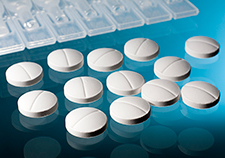Office of Research & Development |
 |

VA Research Currents archive
May 18, 2017
By Mike Richman
VA Research Communications

The drug lithium has long been used in mental health, mainly as a mood stabilizer. Among other conditions, VA researchers are now exploring its potential for treating traumatic brain injury. (Photo: ©iStock/kievith)
More than 30 years ago, Dr. C. Edward Dixon was in his first faculty post in the Department of Neurosurgery at Virginia Commonwealth University. He conducted tests in the intensive care unit on the electrical brain patterns of patients with severe head trauma.
One day, a scene unfolded in the ICU that became seared in Dixon's mind: Doctors were treating an elderly woman who had suffered a severe brain injury after being kicked in the head by a horse. Efforts to control the intense pressure on her brain were failing.
"I remember standing by the bedside with the medical team as we watched her die and feeling utter frustration that there was no treatment to stop this tragedy," he says. "That was a significant motivator for me professionally."
Dixon, now a research health scientist at the VA Pittsburgh Healthcare System, has devoted his career to seeking treatments to traumatic brain injury (TBI) disabilities. He's specialized partly in studies of drugs to determine if they can potentially be tested in patients with TBI.
Most recently, Dixon led a study that suggests a "novel mechanism" by which the drug lithium "may promote recovery in the injured brain." The lab-based study, published in March 2017 in Experimental Neurology, concludes that lithium "modestly" improved cognitive performance in rats when tested 14 days after they received a TBI. The research also finds that lithium does not reduce motor impairment or brain tissue loss following TBI.
"I remember standing by the bedside with the medical team as we watched her die and feeling utter frustration that there was no treatment to stop this tragedy."
"I was surprised that the cognitive response to lithium was not as robust as indicated in previous reports," he says. "However, this could be due to several experimental design differences between our study and other published studies."
The U.S. Food and Drug Administration has approved lithium for the treatment of psychiatric illnesses such as bipolar disorder or manic depression. VA is currently doing a large trial to test lithium for suicide prevention, based on promising evidence from past research. But the reasons for its therapeutic effect are not fully understood. Lithium can also be used off-label on TBI subjects if researchers conducting clinical trials find it medically appropriate.
Dixon says his lab study marked the first time researchers examined the effects of lithium on the release of neurotransmitters after experimental TBI. Neurotransmitters cause the transfer of a nerve impulse to a nerve fiber or muscle fiber. The researchers evaluated synaptic proteins involved in the transport and membrane fusion of neurotransmitter-containing vesicles, a fluid or air-filled cavity or sac. They used lithium as a tool to improve the transport of synaptic vesicles.

Dixon has long studied neurotransmitters in relation to TBI. He's documented that traumatic brain injuries can produce major reductions in neurotransmitter release in areas of the brain that are vital to memory. Prior to release, neurotransmitters are stored in small spherical sacs within the synaptic terminal. In the process of neuronal firing, the vesicles move to the presynaptic membrane, prompting the release of neurotransmitters. Dixon's recent lab work has found that this process is impaired after TBI.
VA research on traumatic brain injuries has featured efforts to learn more about brain changes in those with both mild and severe TBI. According to the Department of Defense, 22 percent of combat casualties from Iraq and Afghanistan are brain injuries. A TBI can involve symptoms including headaches, irritability, sleep disorders, memory problems, slower thinking, and depression.
Dixon is playing an important role in that research effort. Working under a four-year VA merit award, he and his team are completing studies on the role of the biological machinery of synaptic vesicle transports on the lack of neurotransmitter release after TBI. Their goal is to determine the effects of chronic TBI on key SNARE complex mechanisms of neurotransmission. The SNARE protein complex is the process of fusing two membranes, or proteins that form structures within cells.
The researchers hypothesize that chronic cognitive deficits following TBI may be partly linked to problems with the SNARE complex and the subsequent drop in neurotransmitters. They are trying to learn if lithium can restore the SNARE complex, cognitive function, and histopathology, or changes in tissue caused by disease.
In the most recent study, lab tests were done at the University of Pittsburgh, where Dixon heads the Brain Trauma Research Center in the department of neurological surgery. The research team used a gas-controlled piston to induce TBI in anesthetized rates. The technique is commonly used in labs to gain insight that can help people with traumatic brain injuries.
The rodents were injected with a saline solution containing lithium. During the two weeks following TBI, the researchers examined the effects of daily lithium treatment on motor and cognitive function, cell loss, and the level of SNARE proteins. Some of the rats were also evaluated for spatial memory retention, the part of the memory that records information about one's environment and spatial orientation. The lithium modestly improved spatial memory in the rats by the two-week mark after TBI, according to the study.
The findings also showed the drug increased the amount of key SNARE proteins and promoted SNARE complex formation following TBI. "These findings highlight that treatment with lithium increased the abundance of synaptic proteins that facilitate neurotransmission and may contribute to improved cognitive function after TBI," the researchers write.
The investigators don't yet know precisely which chemical constituents in lithium might be at play.
"At this point, TBI researchers have not identified the exact causes of lithium's therapeutic benefit," Dixon says. "Lithium is a chemical element and thus has no ingredients. However, lithium has effects on multiple cellular processes that likely contribute to its positive effects. In regard to synaptic proteins, it's possible that lithium affects the cell signaling involved in synaptic trafficking."
Regarding the study's finding that lithium doesn't reduce motor impairment or brain tissue loss after TBI, Dixon says it's possible the two are related. He explains that the lesion in the rats was in brain regions tied to both motor and somatosensory function. The latter relates to a sensation in the body such as warmth or pressure.
"The cortical lesion is consistent with an area of maximal mechanical force associated with the injury," he says. "It is possible that cortical lesions and associated motor deficits are less sensitive to lithium therapy than other cellular processes."
The investigators called for more research to understand how TBI reduces the amount of SNARE proteins and how lithium promotes SNARE complex formation to "optimize therapeutic strategies to promote synaptic function in the injured brain." Future studies will evaluate the effects of lithium at more chronic time points after TBI, Dixon says, noting that his team is examining the impact of the chemical at three months post-injury in mice.
As he continues to explore lithium's benefits in the lab, Dixon hopes his group's work will set the stage for a clinical trial down the road. "Our studies will contribute to the growing body of pre-clinical evidence to support a future clinical trial of lithium for TBI survivors," he says.